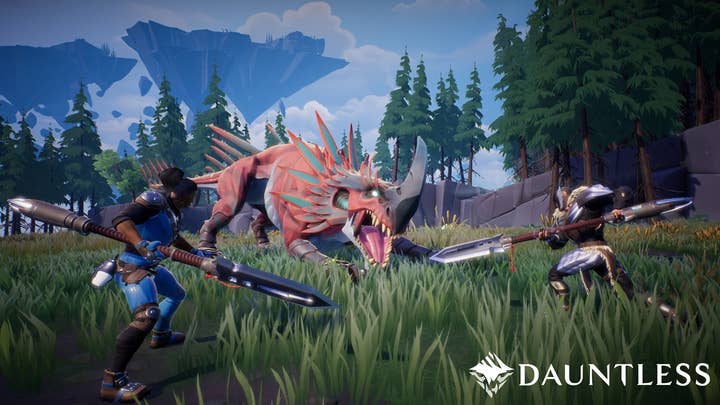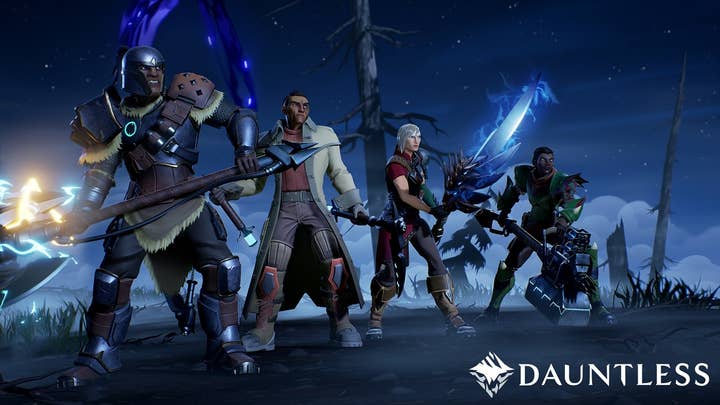Phoenix Labs on walking the line between Dauntless and reckless
In the wake of its latest funding round, co-founder Jesse Houston talks about growing the studio and the game at a deliberate pace
The hunt is over for Dauntless developer Phoenix Labs, at least when it comes to funding. The company today is announcing it has completed a Series C funding round. While Phoenix Labs didn't say exactly how large the investment was, co-founder and CEO Jesse Houston told GamesIndustry.biz it gives the company "a couple years of runway."
To give an idea of what sort of runway Phoenix Labs requires, it now has 90 full-time developers in its Vancouver and San Mateo offices on Dauntless. With the addition of outsourcing and contractors, Houston estimates there are about 200 people working on the PC free-to-play co-operative action hunting game as their primary focus on any given day. Fortunately, that runway is being extended as Dauntless, which launched in open beta in May, has drawn more than two million players, and is bringing in its own money through the sale Supporter Packs and an in-game storefront.
"The launch into open beta went better than we could have possibly anticipated," Houston said, "in some cases like 5x-ing our most aggressive estimates. And the growth over the past four months has continued to be strong."

With the latest funding round consisting of existing investors upping their stake in the company, rather than new financiers contributing new area of expertise, the investment is intended to help build additional content, expand the live service offering, and likely bring it to new platforms. There's plenty of room to grow on the platform front, as Dauntless has achieved its early success avoiding consoles, and even eschewing Steam's Early Access program. When asked about the decision to go it alone for now, Houston said it wasn't based on a reluctance to share revenues with the established storefronts.
"We've been incredibly happy with the amount of players that have decided to play Dauntless thus far, and I wouldn't want to artificially increase that until the game is a little further ahead"
"That had very little to do with our decision making," Houston said. "We wanted to send a strong signal that we are very much a game in development. When we talk about being an open beta, it's very much a rapid iteration cycle we want to create and keep that in folks' minds. Those who are interested in playing games like that--early adopters, if you will--will happily seek out the game wherever it is, especially if their friends are telling them, which is why we don't do a lot of advertising... The reality is most of the folks who play Dauntless come in from somebody on Twitch who happens to play, or a YouTuber, or the vast majority of folks are coming in because their friends play and they want to play with their other friends. And what we've found is it doesn't really matter where the game is for that type of player."
Having even a few trivial hoops to jump through before people can play the game also helps filter out players who are ambivalent about the game or its genre, which Houston said helps create "the right relationship" with the in-development player base. By avoiding major platforms, Phoenix Labs can have more direct communication with its players, emailing them surveys to ask what they thought about a new feature, or even asking them why they did or didn't engage in specific behaviors.
"We would lose a lot of that as we move to these other platforms, and for all the right reasons," Houston said. "Data privacy is a real thing, and we wouldn't want to attempt to create an inappropriate relationship with players on other platforms."
Phoenix Labs is also spending very little on user acquisition at the moment, in part because it doesn't need to.
"We've been incredibly happy with the amount of players that have decided to play Dauntless thus far, and I wouldn't want to artificially increase that until the game is a little further ahead," Houston said. "We have thousands and thousands of people who sign up every day, and we're trying to just keep up with their needs. While it would feel really good as a video game executive to pour even thousands more [in there], but I want to always make sure I'm delivering the right game to the players, and that's the most important thing."
"One of the operational challenges we had as a publishing team was how to grow that market in a cost-effective manner. Along came Capcom and really helped us in broadening that audience"
Interestingly enough, Houston said he's also getting a boost from what is ostensibly Dauntless' biggest competitor, Capcom's Monster Hunter series. The latest entry in that franchise, Monster Hunter World, has proven to be a breakthrough success in the West and Capcom's best-selling game of all-time since its console debut in January. In August, Monster Hunter World launched on PC and gave Dauntless players an alternative on their platform of choice, but Phoenix Labs continued to see net gains.
"When those games have launched, we tend to see significant spikes in engagement in the positive for us," Houston said. "When they do a big marketing push, our sign-ups go up... It really opened the genre up. They put a ton of marketing behind that game, an incredibly polished experience. If I think back to two or three years ago, the number of hunting action gamers in the West probably numbered about one million, maybe two million users at most. One of the operational challenges we had as a publishing team was how to grow that market in a cost-effective manner. Along came Capcom and really helped us in broadening that audience. Hopefully we helped them in some ways as well."

With the growth of investment, the game, and the genre, it's only natural that Phoenix Labs would grow as well. But this year has already seen two cautionary tales about how companies manage periods of intense growth in Telltale Games and Riot Games. Houston said he would love to have the challenge of dealing with the explosive growth either of those two companies experienced, and his approach to that would no doubt be informed from his time as a project manager on Riot's League of Legends. But for now, Phoenix Labs is handling its growth very deliberately.
"The companies I worked at were, let's put it this way, a lot of similar-looking individuals. [There are] a lot of beards at Phoenix Labs"
"We take growth very seriously," Houston said. "We're actually fairly slow about how we grow. I still have to interview every job candidate coming in. As we think about opening a position, we have this internal philosophy called 'Feel the pain, hire to fix it.' We won't hire on any role that we don't already feel internal pressure for. There's no concept of predictive hiring. We'll see we're really stressed about animation and it'll be a long-term stress before we ever go out to hire and fix it."
Anybody working from the company's two offices is a full-time employee, and Phoenix Labs invests heavily in outsourcing to keep costs down.
"We want to make sure folks who come in are not only able to hit the ground running, but have 90 to 120 days of runway painted in front of them, so they know exactly what their future looks like. That tends to create a fairly lean operating environment. While we've grown a bunch, we're still very much of a startup mentality."
At the outset, Houston largely turned to former co-workers to staff Phoenix Labs. The first 23 people at the company had all shipped a game with him, and the vast majority of the team came from personal recommendations of other employees. While there were certainly some benefits to that approach in terms of culture fit and experience (the company's average employee has been in games for more than a decade), there were some negatives as well.
"The companies I worked at were, let's put it this way, a lot of similar-looking individuals," Houston said. "[There are] a lot of beards at Phoenix Labs. So we took a really hard stance on recognizing the value a diverse work environment creates, both within the product and the studio. And we changed the way we were thinking about our recruiting and hiring pipeline to fix some of the challenges standard hiring pipelines create."
Houston said switching from hiring based on portfolio requirements to hiring based on resumés and tests helped them to hire a greater diversity of candidates, but that the actual changes to the recruiting process were minimal.
"A lot of it was just changing our own internal perspective and less about how we communicated the values of the team and the company to potential candidates."
It turns out that simply making a conscious decision to value diversity in the work force can have a significant impact.
"We went from at the end of last year having three women working at the company to having 19 today," Houston said. "It's been hugely effective for us across the board. And you can absolutely see it in the game, where our player base regularly gives us feedback on how they feel represented in the game. We get very positive feedback from areas where we have good team representation, and we get critical feedback from areas where we don't have great representation. It's plain as day."








